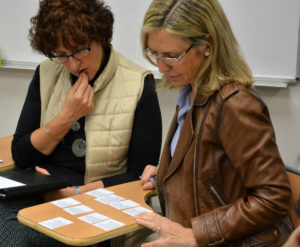2 weeks
Course Length
Mon to Fri
Lesson Days
15 a week
Lessons
English
Language
B2
Minimum Level
Overview
Teaching for Exam Classes is for English teachers who are preparing teenage or adult students for exams. You will look at samples of assessment criteria and ways to use them and refresh your knowledge of current teaching methods. You will gain knowledge of activities for students to engage them during the classes.
During the course, you will review examples of task types from a range of formal exams including the Cambridge FCE, CAE and IELTS. You will see what students need to learn at different levels and ways to teach the different aspects of the exams’ areas.
Completing this course will help you:
- To examine activities to use in exams classes to encourage student engagement
- To glance at models of assessment criteria and approaches to use them
- To revive your knowledge of current teaching techniques
- To consider various aspect in relation to your own teaching and your students’ needs.
Who is the course for?
This course will benefit teachers who are either preparing to teach the first Cambridge or IELTS exam class or experienced teachers looking to refresh his/her skills.
Course Sample programme
Week 1 | Course Content |
Monday | Introduction to the key principles of Learner styles
|
Tuesday | Compare teaching materials to understand the differences in implementing activities to use in exams |
Wednesday | Developing oral communication skills Exploring techniques for correcting oral errors -Using task- based learning to develop speaking skills |
Thursday | Developing students’ reading and writing skills exploring ways of exploiting written texts |
Friday | Encourage student engagement |
Week 2 |
|
Monday | Models of assessment criteria |
Tuesday | Course design |
Wednesday | Revive your knowledge of current teaching techniques |
Thursday | Consider various aspect in relation to your own teaching and your students’ needs |
Friday | Exploring different approaches to testing and assessment – Course review |
*Please note that the course content may be subject to change due to latest methodology trends updates.
1 lesson=45mins
Share This Class:
What people are saying



More Courses
You might also be interested in these courses

Technology for Language Teachers
Technology for Language teachers is aimed at teachers who want to use more technology in the classroom to enhance the learning experience of their students…

Pronunciation and Performance with an expert “Adrian Underhill”
Pronunciation and Performance with an expert is a course led by a world-renowned ELT Consultant and Trainer. Adrian Underhill is an author and the series…

Practical Teacher
Practical Teacher is suitable for teachers who want a practical programme that covers developing resources, practical ideas and methods to liven up classrooms…

Life in Britain
Life in Britain is for teachers interested in finding out about modern British culture. The topics will be taught using a communicative methodology…

Language Development and Teaching Skills
Language Development and Teaching Skills Course is suitable for teachers who want to develop their own knowledge and use of English for the classroom…

Current Trends Teaching Methodology
Current trends will develop an awareness and understanding of current ELT principles and practice and your ability to critically examine current…
Methodologies

Total Physical Response
Total Physical Response is considered to be an excellent way of learning vocabulary. Moreover, since it is based on commands, the students can easily learn the meaning of the words in the target language.

The Structural Approach
This method is based on the opinion that it is imperative to understand the structures of the language. Understanding the complexities of the structures of the sentences in a language is more important than learning the vocabulary of the language.

The Direct Method
This method primarily focuses on the development of oral skills. One of the most important characteristic feature of this method is that visual materials and real-life objects are used. Moreover, such an oral training helps in reading and writing. There is no translation involved in this method.
